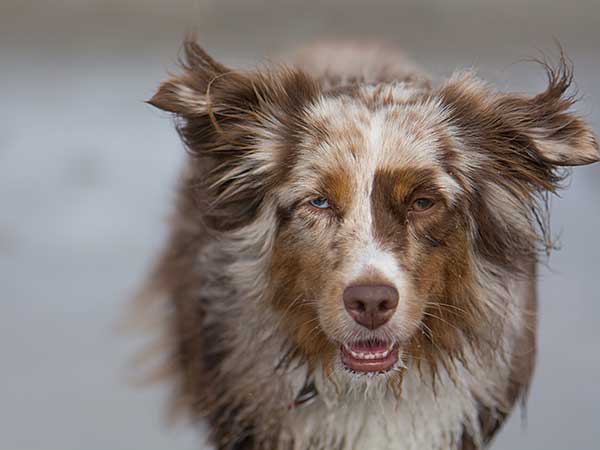
Could Irritable Bowel Syndrome (IBS) In Dogs Affect Your Aussie?
IBS in dogs can be a complicated subject, as it is possible for dogs to develop a number of bowel related issues and it can be difficult to discern one from the other. Often, IBS is misdiagnosed or mistaken for another condition, including inflammatory bowel disease (IBD), but the two are distinctly different. While the precise cause of IBS is not always detectable, some potential causes are dietary intolerances, dog food allergies, and stress.
Symptoms Of IBS In Dogs
What we do know is that irritable bowel syndrome in dogs results in an inability of food to pass through the digestive tract normally. When this occurs, it can result in a number of symptoms, the most common of which is chronic, occasional diarrhea, frequent passage of small amounts of feces and mucus, and constipation.
Other symptoms such as nausea, abdominal pain, bloating and vomiting may also present.

Jill / stock.adobe.com
Causes Of Irritable Bowel Syndrome In Dogs
There can be several different causes of IBS in dogs but the most common is dietary issues including a lack of fiber in the diet. There may also be problems with the motility and function of the colon, possibly caused by issues with neurochemical regulation. In other words, the nervous system isn't sending the proper messages to the colon that allow it to function normally.
Another possible cause of irritable bowel syndrome in dogs is stress, though this isn't always the case. Highly excitable breeds may be more prone to stress related digestive issues but they can certainly affect any dog.
Since the symptoms of IBS can also be related to other conditions such as whipworms and giardiasis, it is important to take your dog to the vet and get a proper diagnosis so that you can rule out any other potential issues.
Treatment Of Irritable Bowel Syndrome In Dogs
Once your vet has diagnosed IBS in dogs, treatment is relatively simple. In most cases it will focus on managing your dog's diet, particularly ensuring that he gets enough dietary fiber on a regular basis to maintain proper colon function.
If stress is a factor, you'll need to identify the specific stress inducing factors and take steps to reduce or remove them entirely. The key is creating and maintaining an environment that promotes good digestion.
Your vet should be able to advise you as to the proper diet to prevent further instances of irritable bowel syndrome in dogs. The rest of the treatment and prevention regimen is up to you.
You need to keep a careful eye on your dog and ensure that he is not being stressed. For active breeds like the Australian Shepherd, this might mean being sure that he gets enough opportunity to work off his excess energy since lack of activity for Aussie's can actually lead to an increased stress level.
If you begin to notice any of the symptoms of IBS in dogs you should get your pet to the vet as soon as possible for a diagnosis. Make sure you inform your vet of any and all potential contributing factors, all of which can help to inform his diagnosis.
The more thorough you are, the easier it will be to dismiss any other potential problems and then you can begin to focus on treatment. You want what's best for your Aussie, so make sure that you're doing everything you can to help him avoid uncomfortable digestive issues such as IBS and you'll both feel better.
For more information about Aussie health issues see the Australian Shepherd Health & Genetics Institute (ASHGI).
Have Dog Training Questions?
Check out these introductory dog training videos...
I want my dog to stop being aggressive.
I want some help training my new puppy.
I want my dog to stop barking at everything.
Get Australian Shepherd Info, Website Updates, Special Offers, and Cartoons...
FREE GIFT
You'll also receive a free copy of the ebook
My Everyday Dog Training Tools
by professional dog trainer Daniel Abdelnoor, "Doggy Dan"










 Loading Image...
Loading Image...